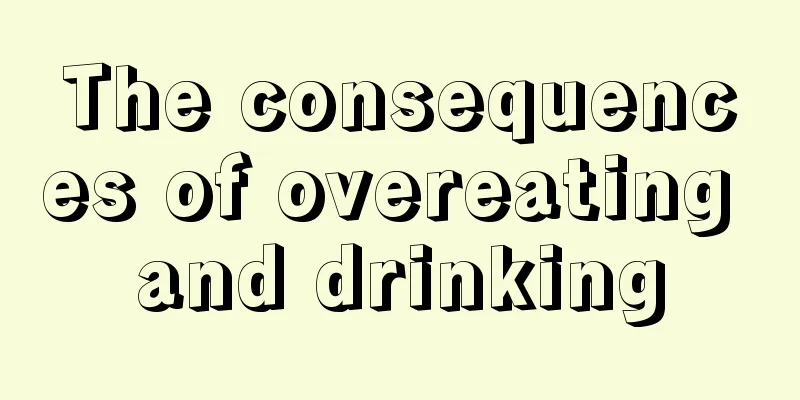The consequences of overeating and drinking

|
Overeating is a very bad eating habit. This eating habit is very likely to cause stomach problems. Overeating will also make the brain slow to react and make our body become bloated and even cause vomiting in severe cases. Therefore, we must develop good living habits. What are the consequences of overeating? The dangers of long-term overeating include the following: 1. Fatigue: Eating too much will cause the brain to react slowly and accelerate brain aging. After people have eaten their fill, all the blood in their bodies goes to the gastrointestinal system to "work", which can easily make people feel tired and drowsy for a long time. 2. Neurasthenia: If you eat too much at dinner, the bloated stomach and intestine will put pressure on the surrounding organs, causing the "waves" of excitement to spread to other parts of the cerebral cortex and induce neurasthenia. 3. Obesity: The high-fat and high-protein foods that modern people often eat are more difficult to digest, and excess "nutrients" accumulate in the body, resulting in obesity and a series of diseases of affluence. Obesity can cause cardiovascular diseases, hypertension, diabetes, fatty liver, arteriosclerosis, cholecystitis, etc., plus the complications caused by them, which may reach hundreds of types, which is very scary. 4. Stomach problems: The direct harm of overeating is increased burden on the gastrointestinal tract and indigestion. In addition, the life span of human gastric mucosal epithelial cells is short and they should be repaired every 2 to 3 days. If the previous meal has not been digested and the next meal fills the stomach, the stomach is always in a bloated state and the gastric mucosa does not have a chance to repair. The stomach secretes a large amount of gastric juice, which will damage the gastric mucosa, making it very easy to develop diseases such as gastric perforation, gastric erosion, and gastric ulcer. 5. Intestinal diseases: Fat clogs the intestines, causing intestinal obstruction and black and bloody stools. 6. Kidney disease: Overeating can damage the human urinary system because too much non-protein nitrogen needs to be excreted from the kidneys, which will inevitably increase the burden on the kidneys. 7. Acute pancreatitis: Eating too much or too well for dinner, coupled with drinking too much, can easily induce acute pancreatitis. 8. Osteoporosis: Long-term overeating can easily cause excessive decalcification of bones, greatly increasing the probability of suffering from osteoporosis. 9. Cancer: Eating too much will reduce the activity of factors that inhibit cell carcinogenesis and increase the risk of cancer. 10. Alzheimer's disease: About 30~40% of Alzheimer's patients have the habit of long-term overeating in their youth and middle-aged years. |
<<: Does Panax notoginseng damage the liver?
>>: What does the half-moon mark on the fingernails represent
Recommend
Will uterine cancer cause chills and fever?
In life, many patients with uterine cancer will f...
Lustful men should be careful about prostate cancer. How to prevent and maintain health?
For men, prostatitis is like a cold, a very commo...
Diet after radical surgery for gallbladder cancer
Patients who have undergone gallbladder cancer su...
What to do if you sleep too deeply
Sleeping too deeply means that your sleep quality...
Can familial cold urticaria be cured?
Whenever winter comes, the incidence of cold urti...
Why do my eyelids keep twitching
Everyone knows that eyelid twitching is a helples...
Does the naked spot fish have many bones?
In fact, we don’t often use naked grouper as a fo...
Uncover 9 secrets of the digestive tract
If you think that the digestive tract is just a s...
How to prevent liver cancer more scientifically? 6 good ways to prevent liver cancer scientifically
The occurrence of liver cancer is a relatively co...
Can optic nerve ischemia be cured?
The optic nerve is a relatively important nerve i...
Can I eat durian after eating bayberry
Bayberry and durian are both fruits with very hig...
Can I eat eggs if I have a gastrointestinal cold
When the seasons change, the flu is at its worst....
Can early lung cancer heal itself? Revealing multiple treatments for early lung cancer
Lung cancer is a highly malignant tumor disease. ...
What to do if the wound after fracture does not heal for a long time
As the saying goes, it takes a hundred days to he...
Why do we close our eyes when kissing
Kissing can sometimes be very awkward, and some c...









